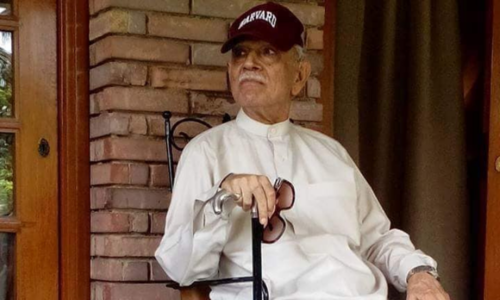
KARACHI: Till 2002, when his book A Journey to Disillusionment appeared, very few knew that Sardar Sherbaz Mazari, a political leader with a typical feudal background, was a keen lover of books, a habit he retained till last. In his departure the country has lost a veteran politician of integrity, truthfulness and clean character.
Born to Balochistan’s Mazari tribal chief Mir Murad Bakhsh Khan Mazari in 1930 at Rojhan Mazari (now in Rajanpur district of Punjab), Sardar Sherbaz Mazari became an orphan when he was two years old. He, his elder brother Mir Balakhsher, younger brother Sher Jan and three sisters were taken in the guardianship of the British government till they grew up.
He studied at the Aitchison College, Lahore, and later at the Royal Indian Military College, Dehradun (India). After independence he returned to Rojhan Mazari and looked after family matters.
Although coming from a Baloch family that retains a high degree of tribal traditions, Sardar Sherbaz developed a taste for politics at a young age; he later conceded that he spent his youthful days in politics, but unlike many feudal lords he cultivated a liking for reading which developed into an intense love for books and collection of rare writings. He knew the sources from where he could get the best books of his choice — mostly about history and political history.
In search of books, he once found a rare book on the conquest of Sindh. When he was acquiring that book he encountered Zulfikar Ali Bhutto, who also wanted it but Sardar Sherbaz flatly refused to oblige.
In January 1953, he married Begum Souriya Ahmed, the daughter of a senior civil servant, who was born into a Kashmiri family and grew up in south India. After the birth of their first child, he married Begum Munawar Bugti, the sister of Nawab Akbar Bugti, in December 1953.
As an enthusiastic young man he joined politics in 1964 when Miss Fatima Jinnah became the combined opposition’s presidential candidate against Gen Ayub Khan. Because he opposed dictatorship, he supported Miss Jinnah’s campaign, although it had become known that official machinery would engineer the elections. Miss Jinnah’s defeat did not dissuade him from continuing to oppose authoritarian rule.
So, when Gen Yahya Khan took over from Ayub Khan in 1969, he opposed the move. In the 1970 elections, when Z.A. Bhutto’s People’s Party created quite a stir in the country’s politics, he contested as an independent candidate and was elected as a member of the National Assembly.
When Yahya Khan decided to take military action in the-then East Pakistan, he opposed the decision. However, when Bhutto took over after Dhaka’s fall, he supported the PPP government.
During the PPP rule, he tried to resolve the Balochistan issue politically, but Mr Bhutto was adamant on taking military action. Dejected, Sardar Sherbaz joined hands with Wali Khan. The government later made a reference to the Supreme Court about Wali Khan’s National Awami Party (NAP) and the party was banned.
This made the Baloch leader more desolate and he founded a new party, the National Democratic Party, of which he remained head from 1975 to 1985. He also remained leader of the opposition in the National Assembly from 1975 until Gen Ziaul Haq promulgated martial law in 1977.
He also joined the campaign launched by the Pakistan National Alliance that ultimately led to ouster of Mr Bhutto’s government on July 5, 1977. But in 1983, he helped PPP and other parties to launch the Movement for Restoration of Democracy (MRD), which spread awareness in the country about the need for a political setup.
He once said: “Pakistanis deserve better than the crises that are regularly inflicted upon them. The people of Pakistan cry out for honesty and integrity.”
Having proved on several occasions that he had a strong will, he showed that he had also been blessed with political wisdom when he developed differences with Sardar Khair Bakhsh Marri, who wanted to launch an armed struggle for the rights of Baloch people; he opposed the idea because such a struggle would bring bloodshed to an already oppressed people.
The 1973 constitution became a much-debated issue when Mr Bhutto tried to turn it into a consensus document. A number of leaders opposed it, but when the PPP founder explained its implications all of them signed it, including Wali Khan.
However, in 1988 Mr Khan rejected the same document, saying it had outlived its utility as it had failed to protect the rights of smaller provinces. But Sardar Sherbaz opposed this as he thought a new constitution could not ensure provincial autonomy, which had already been enshrined in the 1973 constitution.
He fought his last election battle in 1988, which he lost. After that he retired from active politics and diverted his full attention to the books that he had so fondly collected over the years. He also began to write his memoir, which is full of revelations and valuable observations.
On April 19, 1993, when Ghulam Ishaq Khan dissolved the Nawaz Sharif government, his elder brother Mir Balakhsher Mazari was appointed as caretaker prime minister. Sardar Sherbaz did not object to this nor did he ever influence his brother.
Till his last he did not betray his ideals and was not waylaid for personal gains. He turned down several cabinet positions and never surrendered to any authority. He was the only politician during the Zia regime who was banned from entering all the four provinces of the country.
Published in Dawn, December 6th, 2020












































